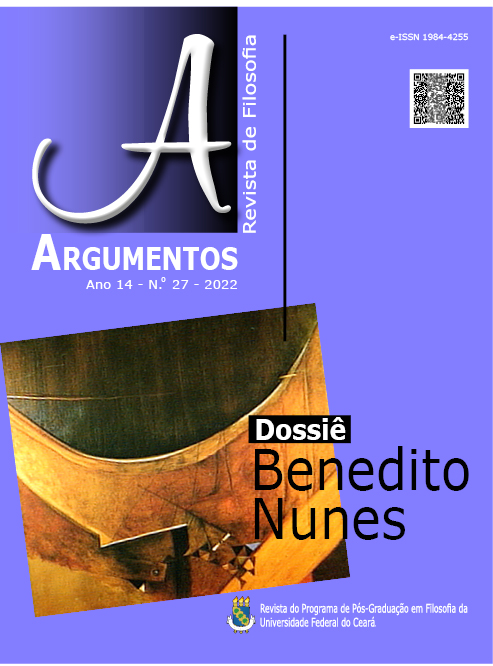‘Só se sente nos ouvidos o próprio coração’
DOI:
https://doi.org/10.36517/Argumentos.27.7Keywords:
Search for the Self. Desire. Passion. Benedito Nunes. Clarice Lispector.Abstract
In An Apprentice or the Book of Pleasures Clarice Lispector employs elements of Greek Mythology in the composition of the protagonists of her drama, as we can see in the direct allusion of Odissey XII, where Odysseus escapes the seduction of the siren’s songs by binding himself to the masthead of his ship. In the claretian drama, the search for the self, starting from the other, is the link that both unites, divides, and reverses the Homeric characters, being Loreley the siren who teaches her charms to Ulisses, the teacher of philosophy, who thus turns from seducer to apprentice. To comprehend the poetic-philosophical core of the process of recognition of the consciousness of both characters that surfaces and then is recomposed, I shall revisit the analysis made by Benedito Nunes in both O Drama da Lingaguem and O Dorso do Tigre.
References
BARTHES, R. O prazer do texto. Trad. J. Guinsburg. São Paulo: Perspectiva, 1987.
BLANCHOT, M. O espaço literário. Trad. Álvaro Cabral. Rio de Janeiro: Rocco, 1987.
BLANCHOT, M. O livro por vir. Trad. Leila Perrone Moisés. São Paulo: Martins Fontes, 2005.
BRISSON, F. Lorelei. In: BRUNEL, P. (Org.). Dicionário de mitos literários. Trad. Carlos Sussekind et al. 3ª ed. Rio de Janeiro: José Olympio, 1998, p. 590-596.
FRANKEL, R. D. Ser não precisa de predicativo: uma leitura de Uma aprendizagem ou O livro dos prazeres. Palimpsesto, ano 15, n. 22, p. 382-400, 2016.
FREITAG, B. As cidades formadoras de Clarice Lispector. Revista Brasileira, ano III, n. 78, p. 77-89, jan./mar. 2014.
HOMERO. Odisseia. Trad. Frederico Lourenço. São Paulo: Companhia das Letras, 2011.
LISPECTOR, C. Amor. Laços de família. Rio de Janeiro: Rocco, 1998a.
LISPECTOR, C. A paixão segundo G.H. Rio de Janeiro: Autor, 1964.
LISPECTOR, C. Uma aprendizagem ou o livro dos prazeres. Rio de Janeiro: Rocco, 1998.
MARTÍNEZ, H. L. Benedito Nunes, leitor de Clarice Lispector, ou o drama de habitar uma linguagem sitiada. Revista de Filosofia Aurora. Curitiba, v. 25, n. 37, p. 271-287, jul./dez. 2013.
MENESES, A. B. Sereias: sedução e saber. Revista do Instituto de Estudos Brasileiros, n. 75, p. 71-93, abr. 2020.
NUNES, B. A narração desarvorada. Cadernos de Literatura Brasileira. São Paulo, n. 17/18, p. 292-301, 2004.
NUNES, B. Leitura de Clarice Lispector. São Paulo: Quíron, 1973.
NUNES, B. Literatura e filosofia: Grande sertão: veredas. In: LIMA, L. C. Teoria da literatura em suas fontes (v. 1). Seleção, introdução e revisão técnica de Luiz Costa Lima. Rio de Janeiro: Civilização Brasileira, 2002, p. 199-219.
NUNES, B. Meu caminho na crítica. Estudos Avançados, São Paulo, v. 19, n. 55, p. 289-305. 2005.
NUNES, B. O Dorso do Tigre. 2ª ed. São Paulo: Perspectiva, 1976.
NUNES, B. O drama da linguagem: uma leitura de Clarice Lispector. São Paulo: Ática, 1989.
NUNES, B. Poesia e filosofia: uma transa. A Palo Seco. Escritos de Filosofia e Literatura, Aracajú, ano 3, n. 3, p. 8-17, 2011.
PLATÃO. A República. 15ª ed. Trad. Maria Helena da Rocha Pereira. Lisboa: Calouste Gulbenkian, 2017.
PLATON. La République. Trad. Georges Leroux. Paris: GF-Flammarion, 2002.
PLATON. Le Banquet. Trad. Luc Brisson. Paris: GF-Flammarion, 1998.
PLATÃO. O Banquete. Edição bilíngue. Trad. José Cavalcante de Souza. São Paulo: Editora 34, 2016.
TRABATTONI, F. Platão. Trad. Rineu Quinalia. São Paulo: Annablume, 2010.
Downloads
Published
Issue
Section
License
Argumentos magazine is licensed under an International Creative Commons Attribution License.
The Magazine uses CC BY inclusion
1) The authors retain the copyright granted to the magazine or the right to initial publication, with the work regularly licensed under the Creative Commons Attribution, which allows the sharing of the work with acknowledgment of authorship and initial publication in this magazine.
2) The authors are authorized to contract additional applicable contracts, for non-exclusive distribution of the version of the work published in this journal (for example, publication in the institutional repository or as a chapter of the book), recognition of authorship and initial publication in this journal.
3) Authors are authorized and encourage to publish and distribute their work online (for example, in institutional repositories or on their personal pages) at any time before or during the editorial process, as they can generate productive changes, as well as increase the impact and reference of published work.




.jpg)










._._3.png)
1.jpg)
._._._.png)
